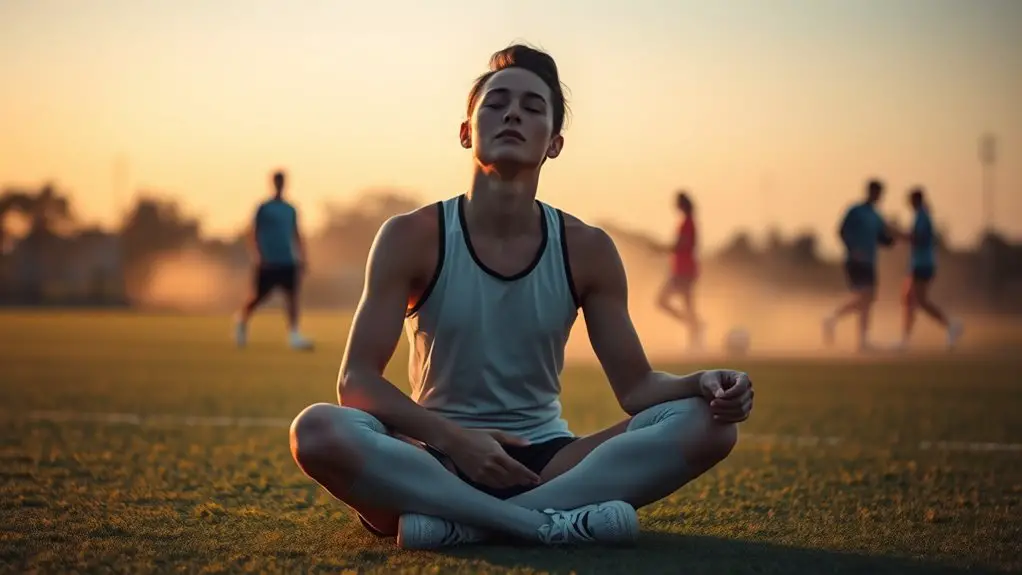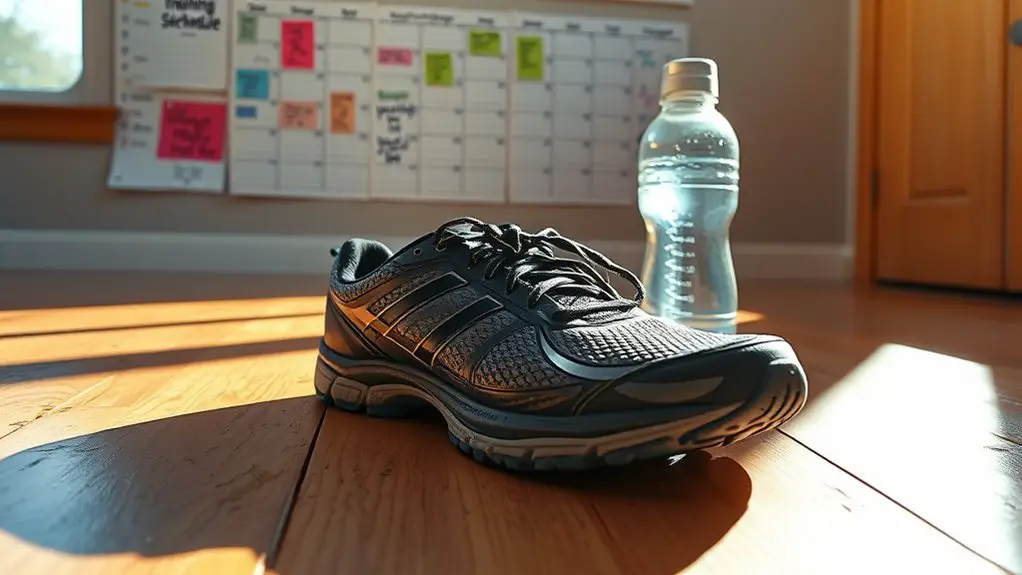Meditation plays an essential role in enhancing your athletic focus, helping you stay sharp during high-pressure situations. By practicing techniques like mindful breathing or visualization, you can improve concentration and reduce anxiety. Meditation also fosters self-awareness and promotes a calm state of mind, allowing you to perform at your best. It's a powerful tool for better performance and recovery. If you want to explore how to incorporate meditation into your training, there's more to discover.
Understanding Meditation and Its Benefits for Athletes
When you think about athletic performance, meditation might not be the first thing that comes to mind; however, it's a powerful tool that can enhance focus and mental resilience. By incorporating meditation into your routine, you can create a sense of calm that helps you stay grounded during high-pressure situations. This practice allows you to tune out distractions, allowing you to fully immerse yourself in your training or competition.
Meditation also fosters self-awareness, helping you understand your thoughts and emotions better. With this knowledge, you can harness your mental energy, turning it into a driving force that propels you forward. Additionally, the deep relaxation gained from meditation can speed up recovery, giving your body the freedom it needs to perform at its best. Research indicates that meditation can improve concentration and reduce anxiety, making it an essential practice for athletes. So, if you're seeking clarity and enhanced performance, consider embracing meditation as a key part of your athletic journey.
The Science Behind Meditation and Performance Enhancement
While many athletes might overlook meditation as a performance enhancer, research reveals its significant impact on both mental and physical capabilities. Studies show that meditation can enhance focus, reduce anxiety, and improve overall well-being, all vital for peak athletic performance. When you meditate, your brain's neuroplasticity increases, allowing you to adapt more readily to challenges, whether on the field or in the gym.
Additionally, mindfulness meditation promotes a state of flow, where distractions fade away, and you're fully immersed in your activity. This heightened state of awareness helps you maintain concentration during key moments of competition. Physiologically, meditation can lower cortisol levels, reducing stress and fatigue, which means you'll recover faster and perform better. By embracing meditation, you're not just cultivating a peaceful mind; you're releasing your potential, enhancing your performance, and finding freedom in your athletic journey. Moreover, enhanced focus can lead to improved concentration during events, ultimately contributing to better performance outcomes.
Techniques for Incorporating Meditation Into Training
Incorporating meditation into your training routine can be straightforward and highly rewarding. Start with short sessions, maybe just five minutes, focusing on your breath or a mantra. Gradually increase the duration as you become more comfortable. Here are a few techniques to take into account:
| Technique | Description |
|---|---|
| Mindful Breathing | Focus on your breath, inhaling and exhaling deeply. |
| Body Scan | Mentally scan your body, releasing tension from head to toe. |
| Visualization | Picture yourself achieving your goals, enhancing motivation. |
Try integrating these practices before workouts or competitions. Just find a quiet space and let go of distractions. With consistency, you'll notice improved focus and a deeper connection to your athletic performance. Embrace the freedom that meditation brings to your training journey!
Success Stories: Athletes Who Meditate
Many elite athletes have turned to meditation to enhance their performance, demonstrating its powerful impact on focus and mental resilience. You might be surprised to learn that some of the world's top performers incorporate meditation into their routines. Here are three inspiring success stories:
- LeBron James: The NBA superstar credits meditation for helping him maintain focus during high-pressure games, allowing him to perform at his best.
- Brock Lesnar: The MMA fighter and wrestler uses meditation to calm his mind before fights, enhancing his mental toughness and strategic thinking.
- Gabby Douglas: The Olympic gymnast practices mindfulness to stay present and manage competition anxiety, contributing to her success on the world stage.
These athletes show that embracing meditation isn't just about relaxation; it's about releasing your true potential and achieving freedom in your performance. You can do it too!
Overcoming Challenges in Developing a Meditation Practice
Although starting a meditation practice can be challenging, overcoming these hurdles is essential for reaping its benefits. You might struggle with distractions, a busy mind, or even just finding the time. Remember, it's okay to start small. Try dedicating just five minutes each day to sit quietly and focus on your breath. Gradually increase this time as you grow more comfortable.
Consistency is key, so choose a time that works for you, whether it's early morning or right before bed. When doubts creep in, remind yourself that every athlete faces setbacks; it's part of the journey. Celebrate small victories, like having a focused session, and don't be too hard on yourself if your mind wanders. Embrace the process, and you'll find that meditation not only enhances your focus but also liberates your mind, allowing you to perform at your best in both sport and life.
Frequently Asked Questions
How Long Should Athletes Meditate for Optimal Results?
Imagine your mind as a calm lake; to achieve ideal results, you should meditate for 10 to 20 minutes daily. This consistent practice helps you find clarity, focus, and ultimately, the freedom to excel.
Can Meditation Replace Traditional Mental Training Methods?
Meditation can complement traditional mental training methods, but it shouldn't entirely replace them. You'll find that blending the two can enhance your mental resilience and focus, providing a more holistic approach to your performance.
Is There a Specific Time of Day to Meditate?
There isn't a one-size-fits-all time to meditate. You'll find what works best for you—morning, afternoon, or evening. Trust your instincts; consistency is key, and your mind will thank you for it.
What if I Struggle to Clear My Mind While Meditating?
If you struggle to clear your mind while meditating, it's okay. Try focusing on your breath or a mantra. Over time, you'll find it easier to let thoughts drift away and embrace stillness.
Are There Specific Meditation Styles Best Suited for Athletes?
While no meditation style's a magic wand, athletes often find mindfulness and focused breathing techniques particularly liberating. These practices can heighten awareness, foster resilience, and help you channel your energy towards peak performance effortlessly.




